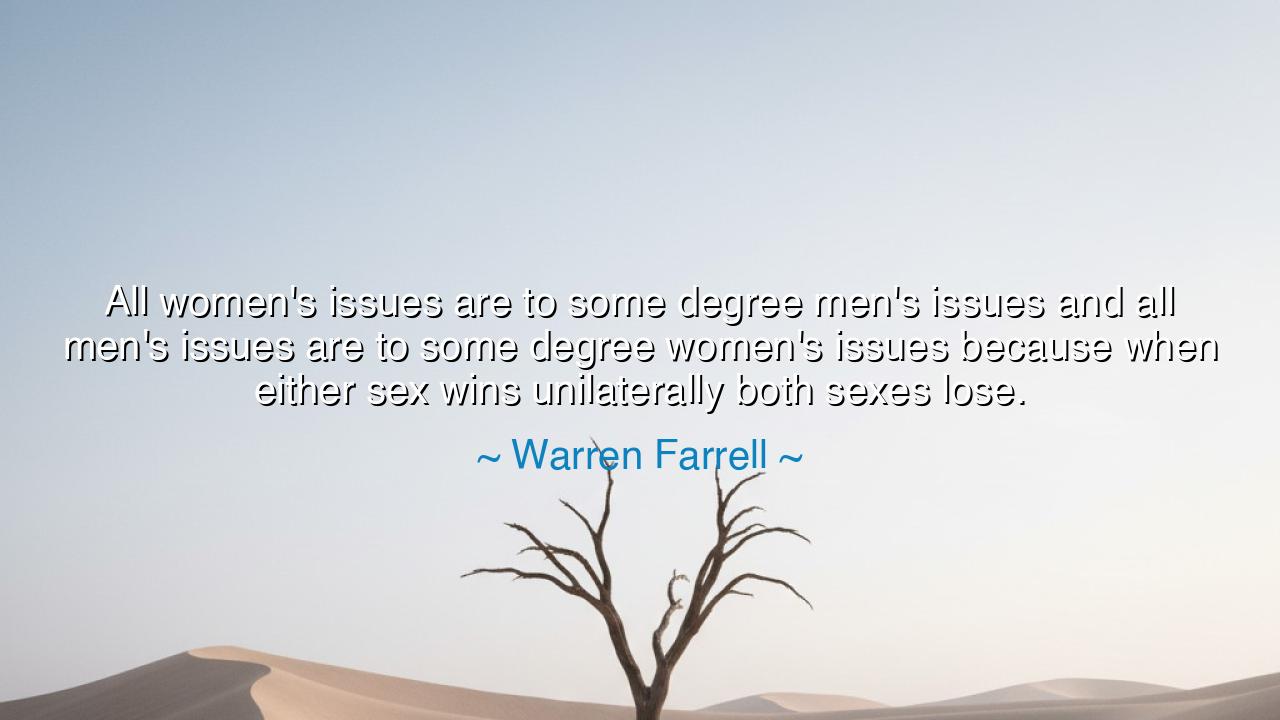
All women's issues are to some degree men's issues and all men's
All women's issues are to some degree men's issues and all men's issues are to some degree women's issues because when either sex wins unilaterally both sexes lose.






Hear the words of Warren Farrell, who declared with clarity: “All women’s issues are to some degree men’s issues and all men’s issues are to some degree women’s issues because when either sex wins unilaterally both sexes lose.” In these words lies a wisdom as old as the harmony of nature, for the fates of men and women have never been separate paths, but two streams flowing into one river. When one rises while the other is left behind, the river grows shallow; when both rise together, it becomes mighty and life-giving.
The origin of this saying comes from Farrell’s long work in the study of gender relations. Once called “the father of the men’s movement,” he did not seek to pit men against women, but to remind both that their destinies are intertwined. He saw how societies erred when they treated men’s struggles—such as the burden of dangerous work, the expectation of silence in suffering, or the duty to provide—as wholly separate from women’s struggles—such as inequality in rights, exclusion from leadership, or the weight of domestic labor. Each wound inflicted upon one sex echoed into the life of the other, for no man lives without woman, and no woman thrives without man.
History bears testimony to this truth. Consider the suffrage movement. When women won the right to vote, it was not only their victory. It reshaped society, bringing balance to governance and benefiting men as well, for a nation with fuller voices makes wiser choices. Likewise, when laws were passed to protect men from brutal labor in the mines or to limit the endless hours in factories, women also rejoiced, for their fathers, husbands, and sons returned home alive, and their families endured. What helped one inevitably helped the other.
The deeper meaning of Farrell’s words is this: rivalry between the sexes is a false path. To imagine that women can rise while men fall, or that men can flourish while women are suppressed, is to build upon sand. Such victories are illusions, leaving bitterness in place of progress. True gain is found only in shared triumph, where compassion bridges division, and where the well-being of one is tied to the dignity of the other.
The lesson is clear: seek not unilateral victories. When you labor for justice, labor for all. When you champion equality, let it not be the equality of one side against the other, but the balance of mutual respect. For when either sex wins unilaterally both sexes lose, but when both rise together, families thrive, nations prosper, and humanity itself is strengthened.
To the youth, I say: do not be deceived by the voices that preach division. Your sisters’ struggles are your struggles, and your brothers’ burdens are your burdens. To leaders, I say: craft policies that honor the shared destiny of men and women, knowing that one cannot prosper at the expense of the other. To families, I say: teach your children not to see adversaries in the opposite sex, but partners in the great work of life.
Practical action lies before us: listen with compassion across the lines of gender; defend the rights of the other as if they were your own; create workplaces, homes, and communities where both sexes are uplifted together. Celebrate victories that bind rather than divide. For this is the only path to true progress.
Thus Warren Farrell’s words endure like a carved truth upon stone: the struggles of one sex are the struggles of both, and the victories of one must be the victories of all. Let us carry this wisdom into every corner of society, that men and women may rise together, hand in hand, not in rivalry, but in unity. For only then shall we find a future where no one loses, and all may flourish.






THDo Thi Thu Ha
The concept of mutual benefit in gender issues is something I find intriguing. I wonder, though, how we can break free from a zero-sum mindset where one gender’s gain is seen as the other’s loss. What are some concrete examples of where solving one gender’s issue also leads to positive changes for the other?
VSTran Van Sang
This idea of mutual loss really makes sense in theory, but in practice, I feel that we often see issues for one gender being treated as secondary to those of the other. Are we truly seeing both men’s and women’s issues as equally important, or do we tend to focus more on one when it becomes a topic of public discourse?
HNThu Ha Nguyen
I get where this quote is coming from, and I agree that both genders should support each other’s issues. However, sometimes it feels like the struggles of one sex are downplayed in the attempt to focus on ‘equality.’ How do we address gender-specific challenges without overshadowing the issues that disproportionately affect one gender over the other?
HDDoan Hoang Dung
I see the logic behind this, but I also wonder if it's too simplistic. Some issues are inherently more pressing for one gender, like reproductive rights for women or workplace representation for men. Can we truly say these are shared issues when the stakes are so different? Are there situations where one gender's issues should take precedence?
1L13-Cam Ly-12A11
This quote really resonates with me. I’ve always believed that gender equality isn’t just a women’s issue—it’s a societal issue that affects everyone. If one gender gains at the expense of the other, the entire community suffers. So, how can we move forward in a way that benefits both men and women equally, without creating division or competition?